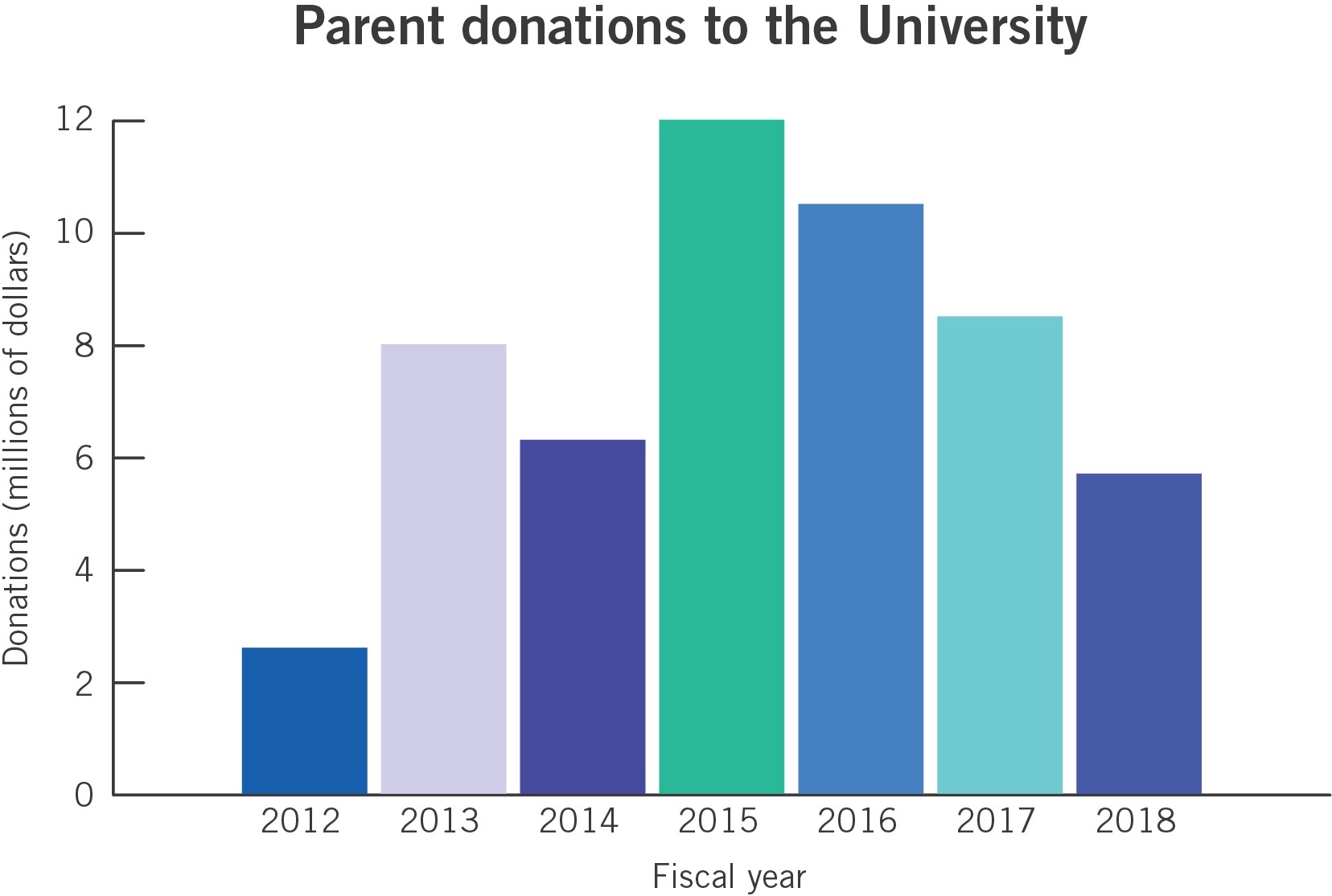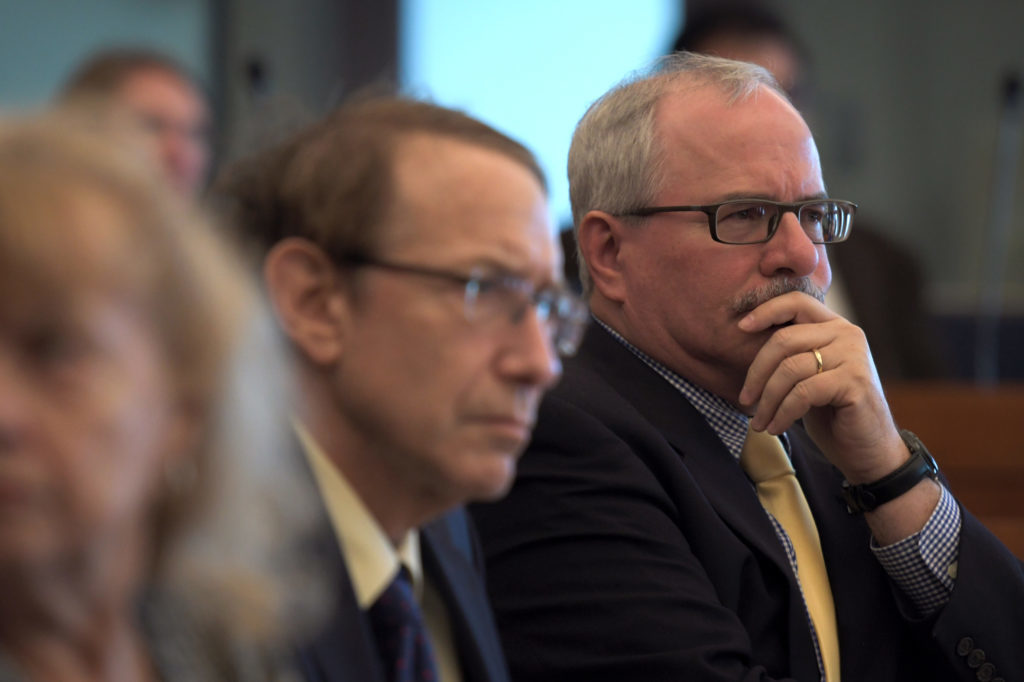Updated: Oct. 15, 2018 at 3:28 p.m.
The University’s donations from parents dropped to a six-year low in fiscal year 2018, clocking in at $5.7 million, officials said.
Donations from parents peaked in 2015 at $12 million but fell consecutively for the next three years, plummeting to $8.5 million by 2017 and dropping another 30 percent the next year. The downward turn could mean parents don’t feel connected to their children’s universities and may not be satisfied with their students’ experiences, experts said.
Parent donations reached the lowest point in recent history in 2012 when the University received $2.6 million. Last year, officials said they expect to raise between $8 million and $10 million a year from parents.
University spokeswoman Lindsay Hamilton said the average giving amount for the last eight years is $6.7 million, and the money raised fluctuates year to year because parents who contribute gifts leave the University with their students.
Hamilton said administrators in the Division of Development and Alumni Relations began identifying and prioritizing potential donors using a new strategy at the start of fiscal year 2019, but she declined to provide any additional details about the new strategy.
“Families make gifts at varying times during a student’s undergraduate years, and non-repeatable gifts come in some years and not others,” she said.

Olivia Columbus | Hatcher Designer
Source: Office of Development and Alumni Relations
The consecutive drop in funds also coincides with the closure of the University’s parent services office, which shuttered in 2016 during an administrative shuffle in the student affairs office. At the time, officials created a new Office of Student Support and Family Engagement, combining family outreach efforts with the CARE Network, Colonial Inauguration and other student support services.
Four of the University’s peer schools, including Northeastern and Georgetown universities, have offices dedicated to family donors or philanthropic efforts.
Hamilton said officials in the development office work to build relationships with parents during events throughout the year, like move-in and Colonials Weekend. Family donations go toward every area at GW, including financial aid funds and the student experience, Hamilton said.
“Fundraisers across the division are collaborating to build relationships with those individuals in a thoughtful, timely way, taking advantage of natural opportunities for engagement over the course of the academic year,” she said.
She declined to say what area received the most support from parents last year. Parent donations helped fund GW’s food pantry in 2016 and a mentorship program for first generation students in 2013.
Fundraising experts said family donations indicate whether parents are satisfied with their students’ experiences at a university – meaning a downturn is likely a sign that parents aren’t connecting with their children’s institutions.
Sandy Butters, the director of parent donations at Northeastern University, said the effectiveness of family philanthropic efforts varies from school to school, but general engagement attempts usually strengthen parents’ bonds to a university.
Butters said Northeastern has raised $22 million from parents in the past five years – less than the $45.3 million GW has raised over the same period.
“Connecting parents is great because they want to support whatever their kids are doing and if they can see things where they can help, they will do that as opposed to something else, at least while you’re a student,” Butters said.
She added that most parents decide to donate because they hear other parents have donated. Advertising parent donations could improve the rate at which parents give, she said.
Fundraising has been a top priority at GW over the past several years. Former University President Steven Knapp completed the University’s largest capital campaign under his tenure, and University President Thomas LeBlanc listed fundraising and alumni engagement as one of his top priorities last academic year.
Despite the falling parent donations, GW raked in nearly $116 million in fiscal year 2018 – the fifth-highest amount in history.
Meg Pagonis, the director of development in the Parents Office at Georgetown University, said when parents and their children who attend a university are happy with their school, they show that satisfaction by giving back to the university.
In Georgetown’s last 10-year giving campaign, $157 million – or 10 percent – of the total campaign contributions came from parents of students, which is standard for the school, Pagonis said.
She said parents have become “accustomed” to supporting the university that their children attend because they are invested in their students’ studies. She said that while parents and other donation groups, like alumni, are different constituents, Georgetown officials try to elicit donations from all groups with the same amount of effort and resources because all funds support a university’s mission.
“Georgetown has given priorities that are important to supporting the mission of the university, and that’s not a different set of priorities for parents versus alumni,” Pagonis said. “You’re still talking about the same priorities and the same important things that support your mission, you’re just talking to two different audiences.”
This post was updated to reflect the following correction:
The Hatchet incorrectly reported that the University’s family philanthropy office closed in 2016. The parent services office was dissolved that year. We regret this error.





